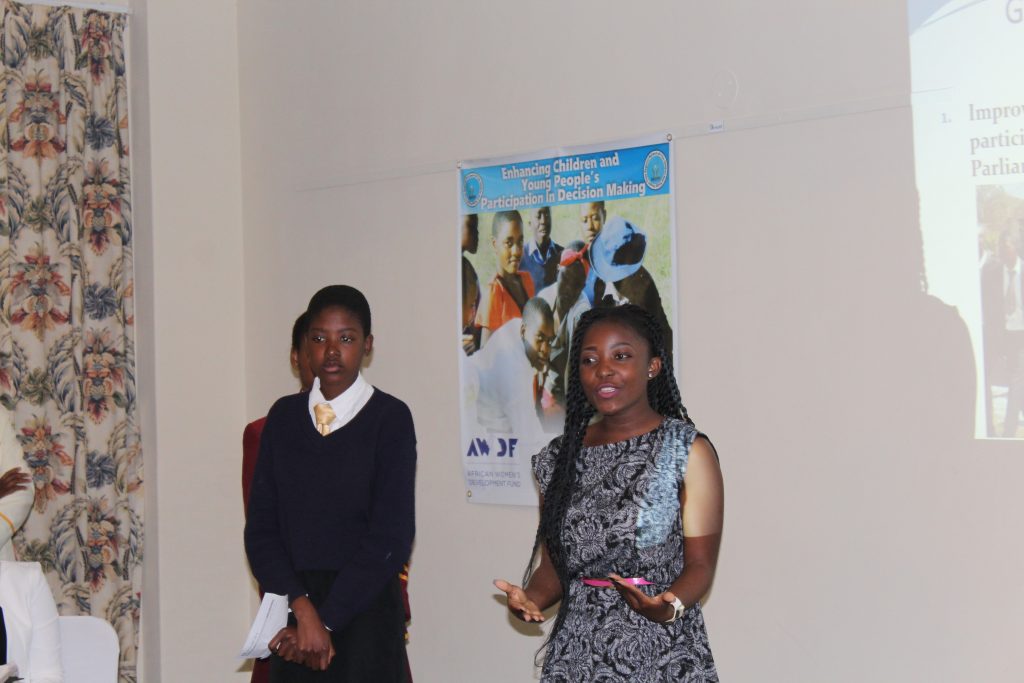BREAKING THE WALLS OF SILENCE:
Young Women’s Empowerment[author] [author_info]FUMISO CHIGOGWANA[/author_info] [/author]
Women emancipation has been a pressing issue with several movements advocating for women to be included in the social, political, religious and economic circles of the society. However, the role and space of girls and young women in these movements seems to have been forgotten. Young women and girls still remain the most vulnerable group in the society faced with various socio-economic, political and religious challenges perhaps owing to negative societal beliefs. As long as the girl child remains underpowered, the women’s movement will not reap much results as most women would have been raised with the belief that their abilities are confined to the home and nothing more.
Without much doubt, the term empowerment is popular in the political circles than it is in other areas of concern in most societies. However, empowerment can be referred to as increasing the spiritual, political, social or economic strength of individuals and communities. In that regard, empowerment generally involves the following; where the empowered have decision –making power of their own, access to information and resources for taking proper decisions, a range of options from which they can take their decisions from (not just yes/no, either/or.),ability to exercise assertiveness in collective decision making, positive thinking on the ability to make change, ability to learn new skills for improving one’s personal or group power, ability to change other people’s perceptions through democratic means, ability to be involved in the growth process and changes that is never ending and self-initiated ,increasing ones positive self-image and overcoming stigma.
Unfortunately, young women in Zimbabwe face plethora of challenges such as early child marriages, gender based violence, low levels of education, stigma from male counterparts, increased rate of infection from HIV/STIs and poverty. Due to these reasons, they generally develop a passive attitude and exclude themselves from taking up challenges. According to the Multiple Indicator Cluster Survey (MICS) 2014; 32.8% of Zimbabwean women aged 20 to 49 were married before the age of 18 and 24.5% of Zimbabwean women between the ages 15 to 19 are married. Child marriage mainly occurs frequently among girls who are the least educated and live in the rural areas where, 1 out of 3 girls is married before the age of 18. Poverty is the main driving force as parents send off their children into marriages so that they can have one less mouth to feed. According to the International Centre for Research on Women (ICRRW), girls who get married between the ages of 10 and 14 are five times likely to die during pregnancy or childbirth as compared to women in their early 20s. If compared to their male counterparts, young women in general lack proper education as most of them drop out of school at secondary level or are not even granted the opportunity to go to school by their parents or caregivers because of poverty. As a result, they lag behind, even in school very few of them attempt to take up science subjects as they are perceived to have an association with males.
Just as the differences on the sizes of our feet exists, every girl is different in her own creation and right. This means that decision making has to be independent and non-controversial. We can model and teach young women to celebrate and enjoy the differences they have with each other. For example, a girl who joins the science club in school where the majority are boys is ignored and mostly the boys tell her to join the cooking class but we can empower the child to find freedom and joy in dominating the majority. Empowerment of young women has to involve educating them about the resistance boys generally develop when girls enter social spaces previously reserved for “the men”. While equality is a beautiful ideal, some boys and men fight to keep women out of their perceived spaces.
As a society we can help young women by educating them, for example telling them that resistance by boys does not mean what they are doing is wrong. Young women need support to cultivate courage, inner strength, positive self-esteem and determination to fight sexism. Often times, women tend to avoid male dominated spaces because they are bullied earlier in life and made to believe that some spaces are reserved for men only and women are not good enough.
The home is also the most influential place that shapes the identity of young women. Girls learn first from home. However, sometimes parents often encourage sons to take up challenges while encouraging daughters to back-off for their own good. Little do parents know that they can empower their daughters by seeing them as equally capable of handling difficult and challenging situations just as their sons. Parents should also protect the girl child from early forced child marriage and teenage pregnancies by teaching and providing them access to Sexual and Reproductive Health Services. Furthermore, the best way to empower girls is at the grassroots level where interaction centres that educate and socialise the girl and boy child to treat each other as equals are established or developed.
In the same vein, society needs a mental revolution to realise the worth and value of young girls. When a girl is empowered, it means a better life for her, the family and the nation at large. Young girls themselves, should rise up and develop inner strength while realising their potential to claim rightful places in society. By so doing, we would have prepared for the journey towards breaking the walls of silence……………………………….

